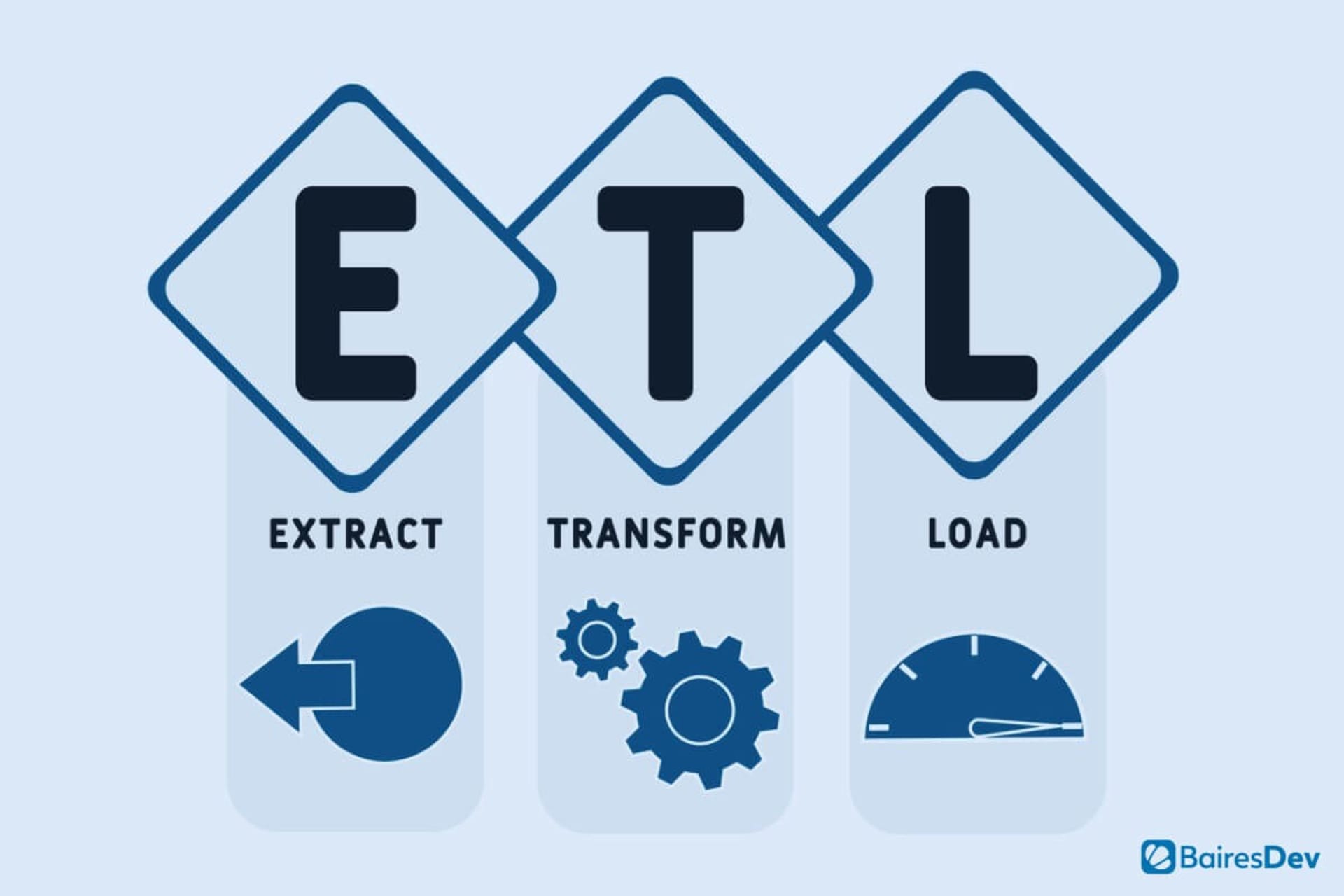Hire ETL Developers
Our top 1% of tech talent has already undergone a rigorous vetting process. Get bilingual, nearshore ETL developers on your team within 2 weeks.
500+ companies rely on our top 1% tech talent.
No time to find the top talent yourself? Skip the hassle of recruitment.




The Ultimate Guide for Hiring ETL Developers
Data complexity is rising, and demand for skilled ETL (Extract, Transform, Load) developers has grown by 50% in the last five years. This makes finding the right talent more urgent than ever. Without the right expertise, your data pipeline could become a bottleneck, slowing down critical operations.
We screen over 1.4 million applicants annually, and less than 1% meet our hiring standards. With more than a decade of delivering software solutions to over 500 companies, we’ve mastered the process of finding ETL developers who can optimize your data operations and drive growth. In this guide, we’ll show you what to look for when hiring ETL developers to strengthen your team.
Before You Start Hiring
Project or Team Requirements
Assess your project's specific needs. If your project involves integrating multiple data sources, managing complex transformations, or handling large-scale migrations, your developer must have relevant experience. For real-time processing, look for skills in tools like Apache Kafka or AWS Glue.
Niche Experience in ETL
Before you hire ETL developers, assess your project's specific needs. Do you need to build a new pipeline or enhance an existing system? If your project involves integrating multiple data sources, managing complex transformations, or handling large-scale migrations, your developer must have relevant experience. For real-time processing, look for skills in tools like Apache Kafka or AWS Glue.
Timeline and Budget
Defining your timeline and budget is essential for ETL development. Long-term, complex setups may require a senior ETL developer, while shorter projects could be handled by mid-level talent. If you need ongoing real-time data integration, robust infrastructure and expertise may be necessary, impacting your budget. Establishing clear goals helps decide if you need a full-time developer, contractor, or larger team.
Adaptability
Developers must adapt to evolving data environments. As new platforms, sources, and formats emerge, developers should integrate them seamlessly into your pipelines. This could mean moving from on-premise to cloud-based platforms like AWS Glue or Google Cloud Dataflow or shifting from batch processing to real-time streaming. Flexibility in handling different tools ensures your system can scale and evolve as needed.
Location and Timezone
ETL processes often require real-time monitoring, particularly for live data streams. Hiring an ETL developer in your time zone allows for faster response to pipeline errors or integration issues, reducing downtime and ensuring timely collaboration. Our software developers are in your time zone to keep data operations running smoothly without delays.
14 Skills Every ETL Developer Should Have
ETL (Extract, Transform, Load) is crucial for moving and transforming data between systems. ETL developers need expertise in tools, databases, and data warehousing to create efficient, seamless pipelines. With the right skills, they ensure smooth data flow, accurate transformations, and optimized performance.
Strong ETL developers reduce errors, speed up processes, and enhance efficiency, leading to faster decision-making and scalable operations. With the right talent, your data pipeline remains reliable, keeping your business ahead.
15 Technical Skills to Look for in Your Ideal ETL Developer
1. SQL Proficiency
A strong command of SQL is essential for querying, updating, and manipulating relational databases in the ETL process. This skill allows developers to handle large datasets efficiently and optimize query performance, which is crucial for ensuring data processing runs smoothly.
2. Data Warehousing
ETL developers must understand data warehousing concepts like dimensional modeling and schema design. Proper data structuring supports fast data retrieval and efficient querying, improving overall business intelligence and analytics.
3. ETL Tools Expertise
Familiarity with tools like Informatica, Talend, and SSIS is vital for automating data extraction, transformation, and loading. Using the right ETL tool enhances reliability, minimizes errors, and scales operations effectively.
4. Scripting Languages (Python, Bash)
Experience with scripting languages enables ETL developers to automate tasks, create custom transformations, and handle complex data operations. This flexibility boosts productivity and allows for the creation of more efficient data workflows.
5. Data Quality Management
ETL developers are responsible for maintaining clean, accurate, and consistent data. Implementing data validation and quality checks helps prevent costly errors and builds trust in the data used for decision-making.
6. Performance Optimization
Optimizing ETL processes for large datasets is crucial for reducing load times and improving system performance. Streamlined processes enhance data availability and reduce resource consumption.
7. Data Modeling
A solid understanding of data modeling is necessary for structuring data in a way that supports efficient ETL and reporting. Proper modeling reduces complexity and speeds up query performance, helping teams gain insights faster.
8. Cloud Platforms (AWS, Azure, GCP)
Experience with cloud platforms like AWS Glue or Azure Data Factory is critical as many ETL processes move to the cloud. Cloud expertise allows developers to build scalable pipelines that adapt to growing data volumes.
9. Data Integration
Integrating data from various sources, such as databases, APIs, and flat files, is a key skill for ETL developers. Effective data integration supports comprehensive analysis and reporting by providing a unified view of disparate data.
10. Version Control (Git, SVN)
Proficiency in version control systems helps ETL developers manage changes to scripts and pipelines, enabling smooth collaboration and reducing the risk of errors. This helps with better maintainability and transparency in ETL projects.
Soft Skills to Look for in Your Ideal ETL Developer
11. Project or Team Requirements
Before you hire ETL developers, assess your ETL project’s specifics. Do you need an ETL developer to design a new data pipeline from scratch or to optimize an existing process? If it’s a matter of integrating multiple data sources, real-time processing, or large-scale data migration, these factors will dictate the level of expertise and tools your ETL developer must have.
12. Niche Experience in ETL
ETL developers often specialize in different tools or industries. Some have deep expertise in platforms like Apache NiFi, Talend, or Informatica, while others focus on specific sectors like finance, healthcare, or retail. Selecting a developer with the right tool and industry expertise ensures they can efficiently handle your unique data requirements.
13. Timeline and Budget
A clear timeline and budget are critical for ETL projects. Are you aiming to complete a one-time data migration or implement an ongoing ETL process for real-time data streaming? Knowing whether you need long-term support or short-term help ensures that you find the right ETL developer for the engagement.
14. Adaptability
ETL environments are constantly evolving, with new data sources, formats, and platforms emerging. Your ETL developer needs to be adaptable, able to work with evolving tools like cloud-based ETL systems and adjust as data requirements shift. This flexibility keeps your data pipeline efficient and scalable.
15. Location and Timezone
ETL processes often require real-time monitoring and adjustments. Having an ETL developer in your time zone facilitates immediate responses to any data flow issues or pipeline failures.
10 Questions to Identify Top ETL Developers
When interviewing ETL developers, it's important to ask questions that first assess the candidates' technical skills and knowledge. Employers will also usually conduct a coding test to further assess specific on-the-job knowledge.
The following set of questions aims to uncover not only the developers’ technical knowledge but also their problem-solving abilities, teamwork, communication skills, and adaptability—all crucial traits for success in a collaborative environment.
Here are a few examples of technical interview questions:
1. Can you explain the difference between ETL and ELT processes?
ETL transforms data before loading it into the target system, while ELT flips that order. In ELT, raw data gets loaded first, and then the transformations happen. ETL is usually better for smaller, structured datasets where you want more control upfront, while ELT works great for big, unstructured data because the target system has the processing power to handle it later. It’s really about choosing the right method based on how much data you’re dealing with and how you want to handle it.
2. What’s your experience with real-time ETL processes?
I’ve worked quite a bit with real-time ETL, especially with tools like Apache Kafka and StreamSets. Real-time ETL is a game-changer for apps that need up-to-the-minute data, like financial trading platforms or e-commerce systems, where even a few seconds’ delay can make a big difference. I’ve built pipelines that can process, transform, and load data instantly so that there’s minimal lag. It’s all about making sure the system stays fast and responsive without missing a beat.
3. How do you ensure data quality during the ETL process?
Data quality is everything. I make sure every step of the ETL process has built-in checks, from validation rules to error handling. Tools like Apache NiFi and Talend are great for automating data validation at each stage of the pipeline. This way, you’re catching inconsistencies or errors early on, ensuring the data that finally gets loaded is clean, accurate, and ready for use. You don’t want bad data sneaking through because that’ll cause problems down the line.
4. How would you design an ETL process for real-time data streaming?
In a real-time ETL process, I’d start by selecting a tool like Apache Kafka or AWS Kinesis, which is designed to handle streaming data. The key here is to process data incrementally rather than in large batches. I would implement message queues to ingest the data in real-time, then use transformation tools like Apache Flink or Spark Streaming to apply necessary transformations as the data flows through. I’d make sure the system is set up to handle potential bottlenecks by scaling horizontally and using parallel processing. This approach is essential for use cases where immediate insights are critical, like financial transactions or live monitoring systems.
5. How do you handle schema changes in source systems?
Schema changes happen all the time, so I always stay prepared for them. I use schema versioning and set up automated validation checks to catch any changes as soon as they occur. I also have alerts in place so the team knows right away when something changes in the schema. That way, we can adjust quickly and keep the process running without major interruptions. It’s all about staying ahead of potential issues.
6. What tools do you prefer for monitoring ETL workflows, and why?
I usually go with Apache Airflow or Talend Data Fabric for monitoring ETL workflows. Both tools are really reliable and offer detailed logging and real-time alerts. This helps me catch errors the moment they happen, which keeps everything running smoothly from extraction to loading. I like how they give you a clear view of the entire process, so you can easily see what’s going on and fix problems right away.
7. Describe a time when you encountered performance issues with an ETL process. How did you diagnose and resolve the issue?
This question explores the candidate’s problem-solving abilities and technical skills in optimizing ETL processes. It reveals their approach to troubleshooting, their understanding of performance bottlenecks (e.g., large data volumes, inefficient queries), and their ability to fine-tune ETL jobs for better performance.
8. Tell me about an ETL project where you had to integrate data from multiple disparate sources. What challenges did you face, and how did you address them?
This question gives insight into the candidate’s experience with complex data integration tasks. It shows how they handle different data formats, databases, and integration tools and whether they can manage challenges like data inconsistency, transformation logic, and validation during the ETL process.
9. How do you manage error handling in an ETL pipeline?
This question reveals how the candidate maintains data integrity and keeps ETL processes running smoothly. A strong answer shows they use proactive measures like logging and error tracking to catch and resolve issues. Their explanation of real-time alerts and error handling gives insight into how they minimize disruptions and maintain a reliable pipeline.
10. Can you describe a time when you had to modify an ETL pipeline due to changing business requirements? How did you adapt to those changes?
This question uncovers the candidate’s adaptability and flexibility in handling changing business needs. It shows how well they manage modifications to existing processes, update transformation logic, and deal with reprocessing or new data sources while minimizing disruption.
FAQs
What are the key benefits of ETL processes?
ETL consolidates data from various sources—databases, cloud platforms, or legacy systems—into one centralized data warehouse system. This structured format speeds up querying and analysis. By applying complex transformations, ETL cleans, standardizes, and enriches data, reducing silos and providing a single source of truth for business intelligence, reporting, and strategic planning.
How do ETL developers handle large datasets?
ETL developers manage large datasets through data partitioning, splitting data into smaller chunks, and parallel processing to speed up workflows. They use indexing to efficiently retrieve data. These methods optimize the ETL applications, allowing terabytes of information to be processed without overwhelming system resources.
Why is data transformation important in ETL?
Data transformation is essential because raw data is often unstructured and inconsistent. Transforming data involves cleaning and reformatting it using a scripting language to make it accurate and consistent across platforms. This step makes data actionable and ready for analysis, preventing errors in reporting to yield meaningful insights for business processes and business intelligence tools.
What’s the difference between ETL and data integration?
ETL is a specific process within data integration, focusing on extracting, transforming, and loading data. Data integration includes broader activities like real-time synchronization and API-based connections, often without transformation. ETL is ideal when significant data transformation and data mapping are required to make it ready for analytics or reporting.
Which industries benefit most from ETL processes?
ETL is especially valuable in data-heavy industries like finance, healthcare, e-commerce, and manufacturing. Finance uses ETL for compliance and reporting, healthcare consolidates patient records for analysis, e-commerce combines customer data for personalized marketing, and manufacturing tracks production data for real-time decision-making.
What is the role of data warehousing in ETL processes?
Data warehouses store transformed data from ETL processes, making it optimized for querying, reporting, and analysis. They handle large volumes of historical data, enabling complex analytics and insights. The data warehouse system is essential for business intelligence, serving as the central repository for structured data.
How can I assess the scalability of an ETL developer's solutions?
Ask candidates about their experience designing scalable data pipelines for growing data volumes. Inquire how they handle large datasets, parallel processing, and resource optimization in SQL Server Integration Services or other ETL platforms. They should design pipelines that easily integrate new data sources and adapt to changing structures. An ETL software engineer who builds scalable solutions will help future-proof your architecture as your data needs grow.

- Hire ETL Developers
How Businesses Can Overcome the Software Development Shortage
BairesDev Ranked as one of the Fastest-Growing Companies in the US by Inc. 5000









